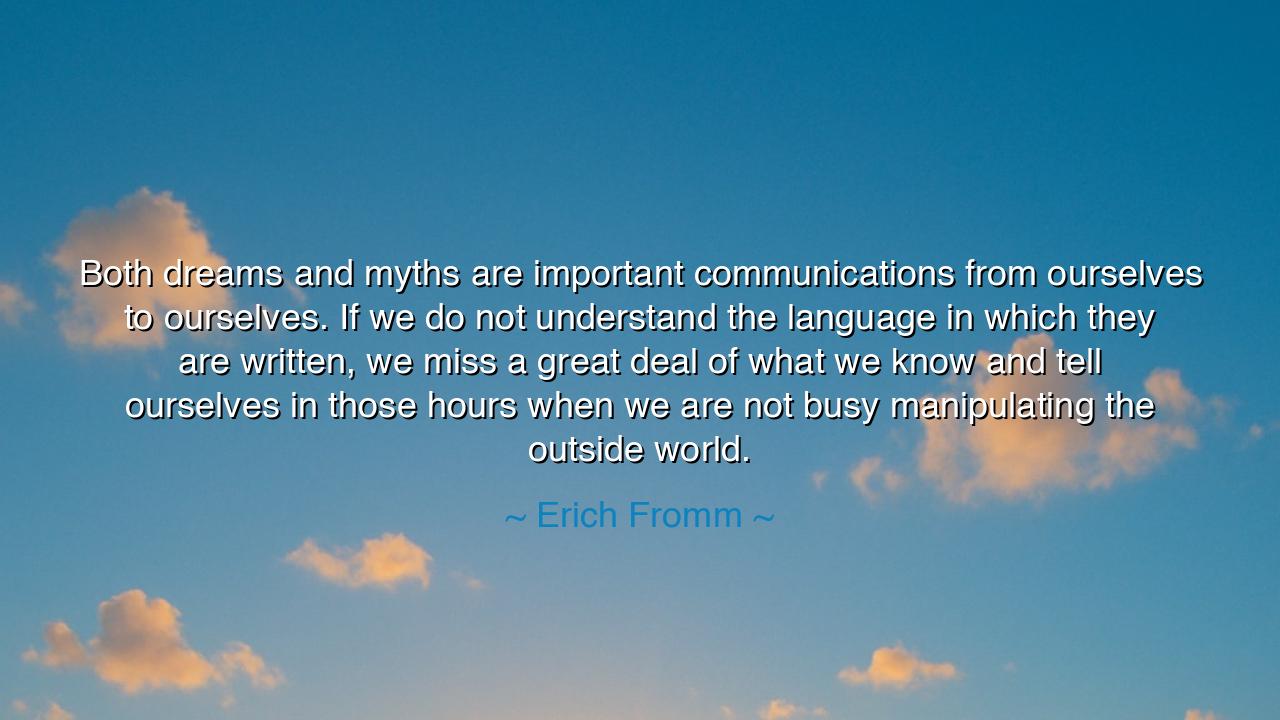
Both dreams and myths are important communications from ourselves
Both dreams and myths are important communications from ourselves to ourselves. If we do not understand the language in which they are written, we miss a great deal of what we know and tell ourselves in those hours when we are not busy manipulating the outside world.






The Hidden Tongue of the Soul
In the quiet chambers of the mind, where reason sleeps and the spirit speaks, there dwell two sacred messengers: dreams and myths. The great philosopher and psychologist Erich Fromm once revealed their nature with these words: “Both dreams and myths are important communications from ourselves to ourselves. If we do not understand the language in which they are written, we miss a great deal of what we know and tell ourselves in those hours when we are not busy manipulating the outside world.” Here, Fromm unveils an ancient truth—that man is not a single voice, but a chorus, and that in the depths of his being, he speaks to himself in symbols older than speech, in images more enduring than time.
Fromm, a thinker of the twentieth century, walked the same philosophical path once trodden by the mystics and sages of antiquity. He believed that beneath the noise of daily life—beneath the endless struggle to shape and control the outside world—there lies another realm, the inner world, where the human soul continues to create and communicate. The dream, he said, is no idle fantasy; it is the mirror of the unconscious, a secret letter from the self to the self. And the myth, that timeless story told by generations, is the dream of a people, the collective soul speaking in parables so that humanity might understand itself.
The ancients knew this well. The priests of Egypt, the philosophers of Greece, the prophets of Israel—all studied the language of symbols. They saw the serpent, the fire, the river, the mountain—not as mere objects, but as revelations of the soul’s journey. When a man dreamed of flying, they did not speak of wings, but of freedom. When he dreamed of falling, they saw not gravity, but fear. To them, every image was a key, and every key unlocked a door to understanding. But in our age, Fromm warns, we have forgotten how to listen. We are so “busy manipulating the outside world” that we no longer hear the whispers of our own hearts.
Consider the tale of Carl Jung, Fromm’s spiritual kinsman, who one night dreamt of descending into a great cavern beneath his home. There, he discovered ancient bones and forgotten idols buried beneath the foundations. Upon waking, he realized that his dream was no random vision—it was the voice of his unconscious, revealing that beneath the modern self lie the buried archetypes of humanity’s shared past. Through that dream, Jung found a language that could bridge science and spirit, psychology and myth. His discovery reshaped the understanding of the human mind. So too does Fromm remind us: to dream is to speak with the deepest part of what we are.
In truth, dreams and myths are not separate—they are twin mirrors reflecting the same light. The individual dreams at night what the culture dreams by day. The myths of Prometheus stealing fire, of Orpheus descending into the underworld, of the hero confronting the dragon—these are not mere stories; they are the symbols of our inner struggles, our yearning for knowledge, love, and freedom. They are communications written in the tongue of the eternal self, telling us how to live, how to grow, and how to heal. To ignore them is to live half awake, blind to the wisdom that dwells within.
Fromm’s message is thus both a warning and a call to awakening. He asks us to turn our gaze inward, to learn again the lost language of the soul. When we dismiss our dreams as meaningless, we silence the deepest teacher we possess. When we mock our myths as superstition, we cut ourselves off from the living roots of our humanity. We become clever, but not wise; informed, but not enlightened. For a man who knows the stars but not his own heart is like a navigator without a compass—brilliant in motion, but forever lost.
So, my children of the restless age, heed this wisdom: listen when the world grows quiet. Remember your dreams, for they are your oldest teachers. Read the myths, for they are the history of your spirit. Do not fear the symbols that rise in your sleep or the strange stories that stir your imagination—they are messages written in the alphabet of eternity. Learn their meanings, and you will begin to understand yourself, not as a fragment lost in time, but as a participant in the great unfolding of existence.
For the soul is not silent; it speaks in the flicker of images, in the rhythm of stories, in the mystery of symbols. To learn this language is to reclaim your wisdom, to find again the divine dialogue between the inner and outer worlds. As Fromm teaches, those who listen to their dreams and honor their myths do not merely exist—they awaken. And in awakening, they become whole.






AAdministratorAdministrator
Welcome, honored guests. Please leave a comment, we will respond soon